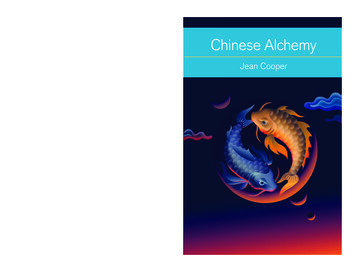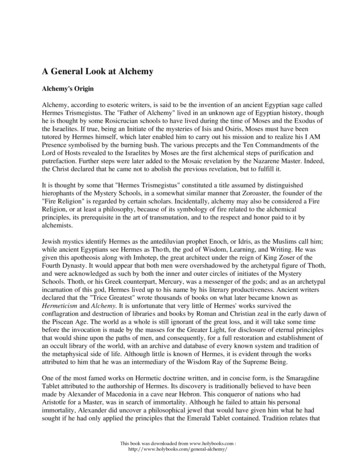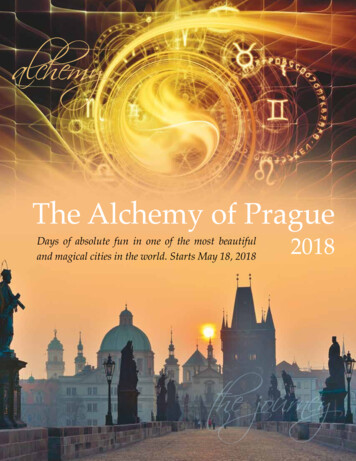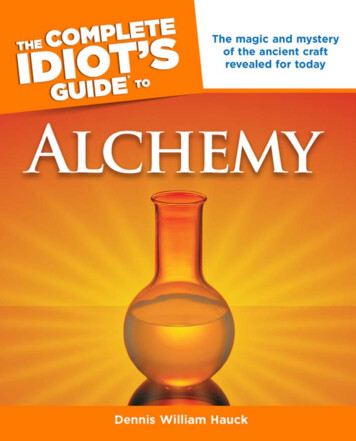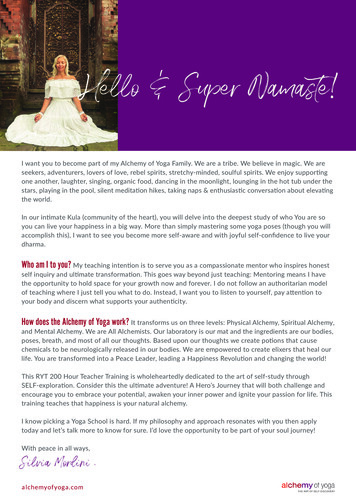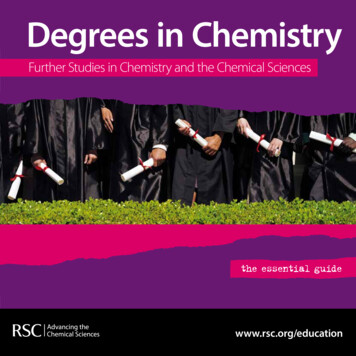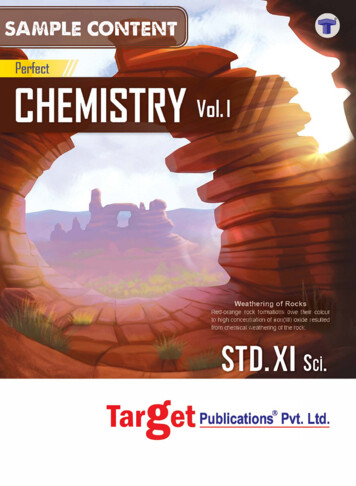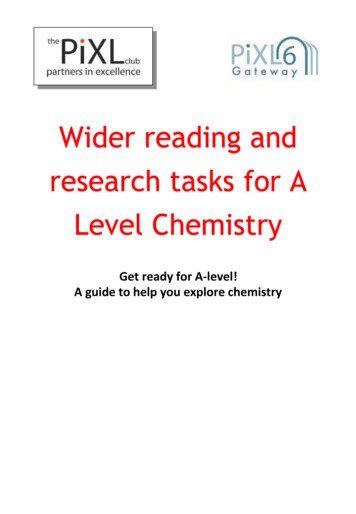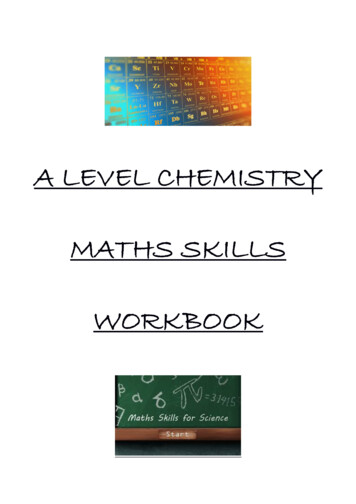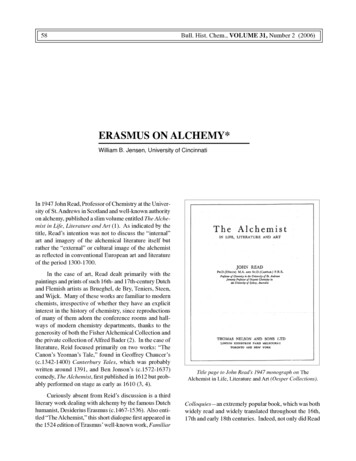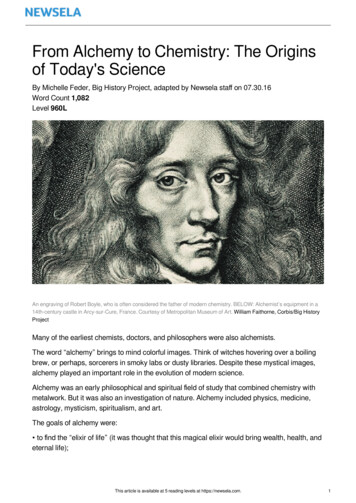
Transcription
From Alchemy to Chemistry: The Originsof Today's ScienceBy Michelle Feder, Big History Project, adapted by Newsela staff on 07.30.16Word Count 1,082Level 960LAn engraving of Robert Boyle, who is often considered the father of modern chemistry. BELOW: Alchemist’s equipment in a14th-century castle in Arcy-sur-Cure, France. Courtesy of Metropolitan Museum of Art. William Faithorne, Corbis/Big HistoryProjectMany of the earliest chemists, doctors, and philosophers were also alchemists.The word “alchemy” brings to mind colorful images. Think of witches hovering over a boilingbrew, or perhaps, sorcerers in smoky labs or dusty libraries. Despite these mystical images,alchemy played an important role in the evolution of modern science.Alchemy was an early philosophical and spiritual field of study that combined chemistry withmetalwork. But it was also an investigation of nature. Alchemy included physics, medicine,astrology, mysticism, spiritualism, and art.The goals of alchemy were: to find the “elixir of life” (it was thought that this magical elixir would bring wealth, health, andeternal life);This article is available at 5 reading levels at https://newsela.com.1
to find or make a substance called the “philosopher’s stone.” When heated and combinedwith copper or iron it would turn it into gold, thought to be the highest and purest form ofmatter; and to discover the relationship of humans to the cosmos and use that understanding to improvethe human spirit.Alchemy was scientific, but it was also spiritual. Some of its practitioners had good hearts. Forinstance, if alchemists could learn the secret of “purifying” copper or iron into gold, they mightgain the ability to purify the human soul. At the same time, many alchemists were viewed ascon artists and fakes. But many alchemists did serious work, that helped lay the foundation formodern chemistry and medicine.Roots in the ancient worldThe origins of alchemy are difficult to track down. In the East, in India and China, alchemystarted sometime before the Common Era (CE). They began with meditation and medicinedesigned to purify the spirit and body and to thereby achieve immortality. In the West, alchemyprobably evolved from Egyptian metal work as far back as 6,000 years ago.Aristotle (384–322 BCE) believed all matter was made of the four “elements” — earth, air, fire,and water. His ideas began to influence alchemy when his student Alexander the Great (356–323 BCE) established Alexandria in Egypt as a center of learning. Alexander is said by someto have discovered the Greek god Hermes’s famous Emerald Tablet, reputed to contain thesecret of the philosopher’s stone.Islamic Arabs took over Alexandria in the 600s CE. They shifted the center of learning toDamascus and Baghdad. Alchemical texts were translated from Greek to Arabic. A famousfigure of that time was Jabir ibn Hayyan (721–815), a royal alchemist in Baghdad. Jabir’swritings were the first to mention important metallic compounds. Like Aristotle, Jabir believedmetals grew in the Earth.But Jabr came up with something new. He believed that the key to the differences betweenmetals was how much mercury and sulfur they contained. Making gold thus required thepurification of these two ingredients. Scholars in the West first learned about alchemy in the1100s and 1200s as they translated Arabic texts into Latin.Alchemy after the Middle AgesAmong the most important of the European alchemists was Paracelsus (1493–1531). He wasthe first toxicologist, a person who studies poisons. Paracelsus believed that the body’sorgans worked alchemically. That is, their function was to separate the impure from the pure.He proposed that a balance of three substances (mercury, sulfur, and salt) was necessary formaintaining health. Paracelsus treated the plague and other diseases with an alchemicalapproach. It included using salts, minerals, and metals. He believed that what he called the“alkahest,” the supposed universal solvent, was the philosopher’s stone. But he had noThis article is available at 5 reading levels at https://newsela.com.2
interest in metals, writing, “Many have said of Alchemy, that it is for the making of gold andsilver. For me such is not the aim, but to consider only what virtue and power may lie inmedicines.”One of the next great alchemists was Robert Boyle (1627–1691). Boyle is sometimes calledthe father of modern chemistry. But he was not a scientist as we think of them. Rather, he wasa natural philosopher, someone who studied fundamental questions about nature and theuniverse before the 1800s He was also an alchemist.Boyle studied the transmutation of the elements. He claimed to have changed gold intomercury by means of “quicksilver,” the ingredients of which he did not reveal.Central to Boyle’s efforts was his “corpuscularian hypothesis.” Boyle believed that all matterconsisted of arrangements of tiny identical particles called corpuscles. Transforming copper togold seemed to be just a matter of rearranging the pattern of its corpuscles into that of gold.Aristotle’s four-elements theory was still around. Boyle sought to overthrow it. Boylerecognized that certain substances decompose into other substances. At some point thoughthere are substances that cannot be broken down any further. For instance, waterdecomposes into hydrogen and oxygen when it is shot through with electricity. But hydrogenand oxygen can't be broken into anything smaller. These fundamental substances that couldn'tbe broken down further he called elements.This article is available at 5 reading levels at https://newsela.com.3
Boyle was a constant experimenter who kept accounts of both his failures and successes. Hewas a pioneer of the scientific method. He endlessly repeated his experiments with slightvariations to obtain better results. He also published the methods and details of his work inclear terms that could be widely understood.A new frameworkBy the late 1700s, the field of chemistry had fully separated from traditional alchemy. Yetchemistry sought to tackle the same questions alchemy once did. Experimentation based onthe scientific method, the publication of research results, the search for new elements andcompounds and their application in medicine to help mankind, were all concerns firstaddressed by alchemists. Now they were part of modern science.Just as alchemy was a touch point for many crafts, chemistry is at the center of the sciences.It's a field of study that looks for answers to big questions.Chemists around the world are developing new techniques and inventions. Like alchemists,sometimes they separate or purify specific components. Other findings might come fromdeveloping new compounds.Some recent research: University of California–San Francisco biochemists identified a memory-boosting chemical inmice. One day it may be used in humans to improve memory. Cheaper clean-energy technologies could be made possible thanks to a new discovery by achemistry professor at Penn State University. The Duke Cancer Institute found that an osteoporosis drug, meant to prevent the weakeningof bones, actually stopped the growth of breast cancer cells. It even worked in resistanttumors.These are just a few examples of how modern chemistry carries on the alchemical quest forthe elixir of life.This article is available at 5 reading levels at https://newsela.com.4
Quiz1Read the section "Roots in the ancient world."Which paragraph supports the idea that Westerners learned about alchemy from the Arabs?2Read this selection from "A new framework."Yet chemistry sought to tackle the same questions alchemy once did.Experimentation based on the scientific method, the publication ofresearch results, the search for new elements and compounds andtheir application in medicine to help mankind, were all concerns firstaddressed by alchemists.What idea do these sentences support?34(A)Chemistry is more difficult to study than alchemy.(B)Chemistry and alchemy have very little in common.(C)Chemistry is an important science, but alchemy is not.(D)Chemistry gained important ideas from alchemy.What is the MAIN idea of the section "Alchemy after the Middle Ages"?(A)Alchemy became more like modern chemistry with the work of Robert Boyle,who used the scientific method.(B)Robert Boyle lived in the 1600s, and he believed that he changed gold intomercury with a substance called "quicksilver."(C)When water is shot through with electricity, it becomes hydrogen and oxygen,but hydrogen and oxygen cannot be further broken down.(D)Paracelsus was a European alchemist who was the first toxicologist - a personwho investigates poisons.Which detail would be most important to include in a summary of the article?(A)Aristotle's student, Alexander the Great, lived from 356 to 323 BCE.(B)In the 600s CE, Islamic Arabs took over the city of Alexandria.(C)Alchemy included other subjects such as medicine, spiritualism, and art.(D)Paracelsus believes that a substance called "alkahest" was a universal solvent.This article is available at 5 reading levels at https://newsela.com.5
to have discovered the Greek god Hermes's famous Emerald Tablet, reputed to contain the secret of the philosopher's stone. Islamic Arabs took over Alexandria in the 600s CE. They shifted the center of learning to Damascus and Baghdad. Alchemical texts were translated from Greek to Arabic. A famous

